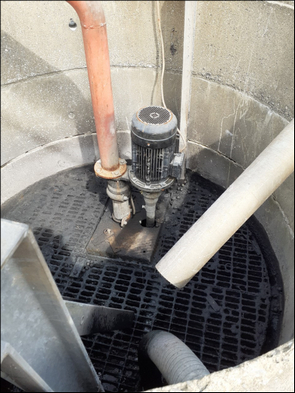When Pittards, the leading leather goods producer, moved part of its manufacturing process from Leeds to Yeovil, they made very sure that its long-serving wastewater pumps went with them.
Founded back in 1826* as glove makers, Pittards transferred its dependable long-shaft chopper pumps (made by Landia), even though they were already 15 years old.
“Keeping hold of the Landia pumps was a must”, said Pittards’ Engineering Manager, Tim Copland.
 Landia Chopper Puimp still going strong in a tough application at Pittards“Pumps in this environment take a huge amount of punishment, dealing with grit and what can be a very slimy mass of small leather pieces that I’m sure would clog other pumps; but with Landia, we’ve never had an issue”.
Landia Chopper Puimp still going strong in a tough application at Pittards“Pumps in this environment take a huge amount of punishment, dealing with grit and what can be a very slimy mass of small leather pieces that I’m sure would clog other pumps; but with Landia, we’ve never had an issue”.
At its facility in Yeovil, where Pittards makes top-quality leather goods, the twin-channel 24/7 wastewater flow of 350m3 to 400m3 per day is first sent to circular tanks containing the Landia long-shaft chopper pumps, before the screening, pH control, chemical correction and then to a Lamella clarifier for final separation of particles from the effluent.
In addition to fashion items such as gloves and handbags, Pittards (with a team of 120) makes performance leathers for sports and the military, treating leather from its tannery in Ethiopia with a series of lengthy softening/hardening processes to produce a wide variety of finishes, including fire resistance.
“Depending on the required finish”, added Tim Copland, “our ‘laundry-type’ process, which can require up to 24 hours, simply has to have a reliable, robust wastewater stream. Over the years, the odd lump of something like a corner part of a pallet block will somehow find its way into the drain to cause us to lift a pump out, but thankfully that doesn’t happen too often”.
‘Value for money investment’
He added: “We know that we ask an awful lot of the Landia pumps, which one has to say, are used and abused, but still continue to show what an excellent, value for money investment they’ve been. We are always vigilant of course about our discharge consent – and have a good working relationship with Wessex Water. The pumps play an important role in ensuring that we keep well within our discharge consent”.
To further prolong their lifetime, Tim explained that the long-shaft chopper pumps are swapped around every 6-12 months, with a unit always kept on standby to ensure that there is little or no interruption to the process. Pittards’ first purchase from Landia (who invented the Chopper Pump back in 1950) was in 2002. After proving its worth, four more pumps were secured in the next two years, followed by further purchases in 2019.
‘Very Good Gatekeepers’
“The Landia pumps have always been very good gatekeepers”, continued Tim Copland, “even with the slimy, clinging nature of the leather pieces, they just keep on going – and are also very easy to service. And whenever we’ve needed advice, Landia are always available on the ‘phone or in-person to help”.
At Leeds, pumps and mixers from Landia (typically 1500rpm / 7.5kW) kept solids in suspension and improved aeration, greatly enhancing the consistency of the facility’s wastewater discharge. As has been the case at Yeovil, the unique external knife system of the Landia Chopper Pump prevents solids from entering its casing; the long-shaft version of the pump more suited to the application because of the inevitable build-up of solid particles. Cast iron has proved more than effective at Pittards, but the pumps can also be supplied in various coatings and materials, including acid-proof stainless steel. The operating range is up to 6 bar, which makes the long-shafts ideal for replacing most displacement pumps that may struggle with wastewater containing solids and hard-to handle pieces of debris.
“One of the pumps we have is over 15 years old”, said Tim. “Despite all the wear and tear, it continues to thoroughly chop and pump the particles and larger debris that we have in our wastewater. The recirculation that the pumps provide also helps keep the tanks clean. Back at Leeds there was equipment that was cast-booted in, with no viable option other than to leave it behind, but looking at life expectancy, which we can break down into a weekly cost, keeping hold of the Landia pumps was a decision that continues to prove very wise indeed”.
